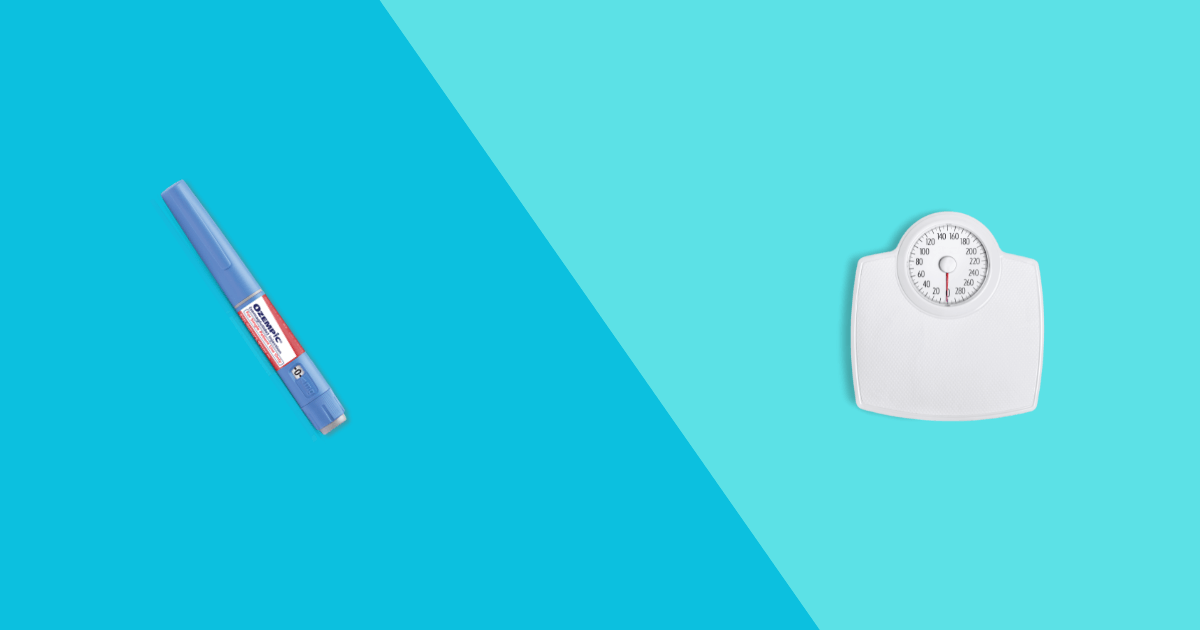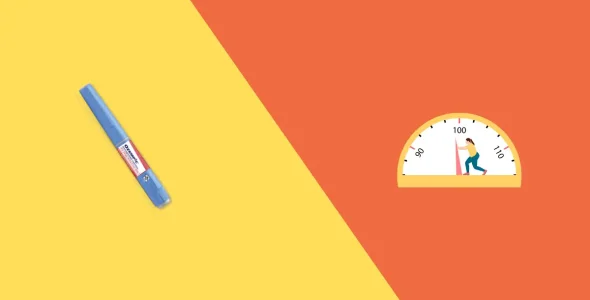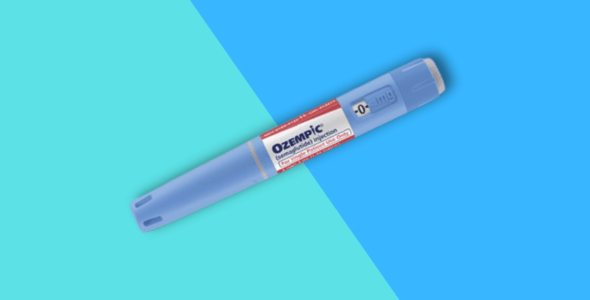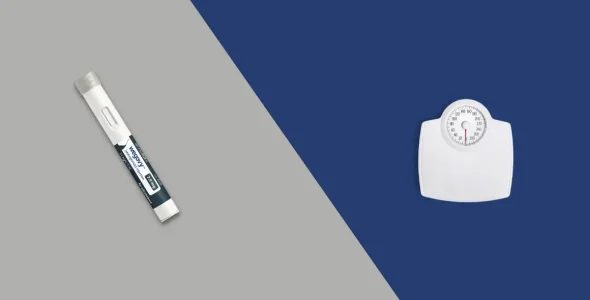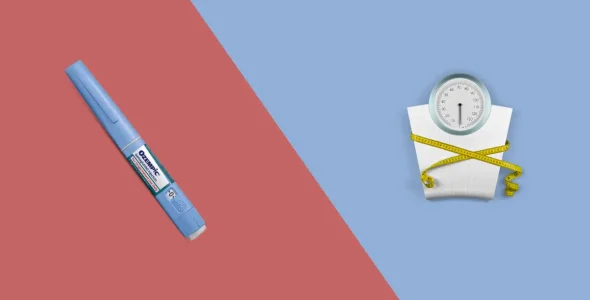How much weight can you lose on Ozempic?
Key highlights
- Ozempic (semaglutide) is an FDA-approved medication for type 2 diabetes and reduces the risk of cardiovascular events in adults with type 2 diabetes and known heart disease. It is also commonly prescribed off-label for weight loss.
- In clinical trials, people taking Ozempic lost an average of 5 lbs per month and the average weight loss was 15 lbs in 3 months.
- How much weight you can lose on Ozempic depends on several factors such as whether you are taking the medication for type 2 diabetes, the dosage strength you are taking, your starting weight, diet, other medications you are taking, exercise and others.
Ozempic (semaglutide) is a once-weekly injectable GLP-1 prescription medication approved for controlling blood sugar levels in people with type 2 diabetes and reducing the risk of stroke, and heart attack in adults with type 2 diabetes and known heart disease. Ozempic has become popular for people trying to lose weight and is commonly prescribed off-label for weight management.
People interested in using Ozempic for weight loss usually want to know how much weight they can lose and how long it takes. While results can vary by individual, a clinical trial reported that the average weight loss achieved over 3 months was 15 pounds or around 5 pounds per month.
Learn more about how much weight you can lose on Ozempic and what you can do to maximize weight loss.
How much weight can you lose on Ozempic?
In clinical trials, around 36 to 66% of participants lost at least 5% of their initial body weight and around 13-26% of participants lost at least 10% of their initial body weight while taking semaglutide. A separate study reported that participants lost an average of 13 to 15 lbs in the first 10 months.
Semaglutide is the active ingredient in Ozempic and Wegovy, another brand name medication that is manufactured by Novo Nordisk and is FDA-approved for chronic weight management.
While the findings in these clinical trials are very encouraging, results can vary by person for a range of different factors including whether you are taking Ozempic for type 2 diabetes, the dosage strength you are using, your initial weight, other medications you are taking, diet and exercise.
Studies show that people with type 2 diabetes typically lose less weight than people without diabetes. The dosage strength is highly correlated with the amount of weight loss achieved, with the higher doses resulting in more significant weight loss than the lower doses. Healthcare providers typically start patients on a lower starting dose of semaglutide and slowly increase the dose to help mitigate potential side effects which are typically gastrointestinal-related such as nausea, diarrhea, stomach pain, vomiting and constipation.
People who take semaglutide typically lose more weight than with diet and exercise alone. In another study that compared semaglutide to a placebo, participants who took a placebo instead of semaglutide lost less than 4% of their body weight over 68 weeks.
Whether you are using Ozempic for weight loss or type 2 diabetes, it’s important to note that the medication is most effective when combined with a healthy diet and exercise.
Weight Loss Calculator
How much weight can you lose in a month on Ozempic?
Ozempic will start working in your body once you start taking the medication. Ozempic is intended to be used long-term and is not a quick-fix solution.
In another semaglutide study for obesity, participants lost around 4.4 lbs or 2% of their body weight in as early as 4 weeks. However, these participants used the lowest starting dose of semaglutide, 0.25 mg weekly, which does not promote significant weight loss.
It’s also normal for people who start taking semaglutide not to see any weight loss in the first 4 weeks of treatment. It’s important to be patient as body weight loss should increase over time as you increase to higher doses.
How does Ozempic work?
Ozempic is a glucagon-like peptide-1 (GLP-1) receptor agonist that helps the pancreas produce more insulin after you eat. The medication activates and binds to the GLP-1 receptors and helps to lower blood sugar levels. Semaglutide also helps to reduce your appetite by inducing the production of glucagon, a hormone in your body that makes you feel hungry.
Ozempic causes a delay in gastric emptying that slows down food leaving your stomach and entering the small intestine, thereby contributing to a feeling of fullness which promotes weight loss.
There is also evidence that GLP-1 agonists such as Ozempic and Wegovy have effects on the brain that help with regulating appetite and feelings of fullness.
Tips for maximizing weight loss on Ozempic
You can do several things to maximize weight loss on Ozempic. Lifestyle changes are an essential first step in weight management and include a healthy diet, physical activity, improving sleep quality, and mitigating stress levels. Seek medical advice from your healthcare provider or a dietitian for personalized recommendations.
In clinical trials, around 1 in 3 participants achieved at least 20% weight loss (44 lbs) with a combination of a low-calorie diet (1,200 to 1,800 calories per day), meal replacement protein shakes, exercise (slowly increased to up to 200 minutes weekly), and multiple visits with a dietitian. Weight loss drugs are known to be more effective when used in combination with diet and exercise.
Healthy diet
Dietary intervention is an essential part of lifestyle modification and an important factor in achieving your weight loss goals, with or without Ozempic. A diet should be tailored according to affordability and food preferences while focusing on healthy food types such as lean proteins (e.g. fish, chicken, beans, tofu, and lean cuts of beef or pork), fruits and vegetables. Consult a dietitian and adopt a balanced diet that limits foods and drinks that should be avoided with Ozempic including refined carbohydrates, greasy foods, fried foods, sugars, and saturated fats.
Studies on the relationship between fried food and obesity have found an association between fried food intake and obesity. Eating fried food away from home was found to be linked with a higher body mass index (BMI) and greater weight gain. Consuming high-fat and sugar-rich food also causes overeating and weight gain.
Sugary beverages and foods such as candy and soda can also lead to overeating and weight gain, according to a research study. These foods can also be problematic for diabetics as the sugar can spike blood sugar levels.
Regular physical activity
Exercise contributes to multiple health benefits, and most of the research suggests that it plays a role in both short-term and long-term weight loss and maintaining weight.
Adults should accumulate around 60 minutes of moderate-intensity physical activity daily. If you can’t do 60 minutes of physical activity daily, try to do as much as you can. Evidence shows that resistance training promotes building and maintaining muscle which is essential for weight loss, and also helps with improving blood sugar levels which is beneficial for people with type 2 diabetes.
A combination of strength and cardio training can help build muscle, burn fat and lose more weight. Having more muscle will burn more calories during the day.
Reduce stress
Stress can also induce overeating and consumption of foods that are high in calories, fat, or sugar, by decreasing physical activity and shortening sleep. Integrate stress-reduction techniques to support your weight loss journey. Chronic high stress can also lead to high blood pressure, weight gain, and insulin resistance.
Sleep
Getting adequate sleep is important for maintaining healthy mental, physical, and emotional well-being. Disturbed sleeping patterns, in terms of both quantity and quality, have been documented to lead to an increase in energy intake, mainly from snacking, especially on foods rich in fat and carbohydrates.
The National Health and Nutrition Examination Survey (NHANES) showed significantly higher rates of obesity in adults who reported an average of less than 7 hours a night of sleep. Several studies have indicated that short sleep duration is associated with obesity and the risk of future weight gain.
Prioritize quality sleep, establish regular sleeping patterns, and create a restful sleep environment to help with your weight journey.
Factors that influence weight loss on Ozempic
Several factors can influence the amount of weight loss achieved on Ozempic. Whether you have type 2 diabetes or not, the dose of Ozempic you are taking, how much you weigh initially, other medications you are taking, and whether or not you make lifestyle changes (e.g., diet and exercise) are important factors attributed to how much weight you can lose on Ozempic. When trying to achieve your weight loss goals, it’s essential to consume fewer calories and exercise regularly.
Dosage strength
A higher dosage strength of weekly semaglutide will generally result in more significant weight loss. While the maximum dosage strength for Ozempic is 2.0 mg weekly, Wegovy dosage strengths go up to 2.4 mg weekly. Wegovy is a weight loss medication manufactured by the same manufacturer Novo Nordisk, and contains the same active ingredient as Ozempic, semaglutide.
Lifestyle changes
Ozempic is intended to be used in combination with lifestyle modifications. The medication is most effective when combined with diet and exercise. While Ozempic will help you lose weight by decreasing your appetite, it’s still important to eat healthy food types such as lean proteins, fruits, and vegetables, and avoid high-sugar foods and drinks.
Other medications
Some medications may contribute to weight gain so it’s important to consider the negative impact to your weight goals as a result of any other medications you are taking. Speak to your healthcare provider about any other medications are you taking.
Bottom line
Ozempic is an effective medication that is commonly prescribed off-label for weight loss. Clinical trials have shown that people using Ozempic can lose up to 5% to 10% of their body weight. However, results can vary by person for a range of different factors such as whether or not you have type 2 diabetes, the dose of Ozempic you are taking, other medications you are taking, and lifestyle changes such as diet and exercise.
To achieve maximum weight loss with Ozempic, you should make positive lifestyle modifications including increased physical activity, eating healthy foods and avoiding unhealthy foods that hinder your weight loss goals.

